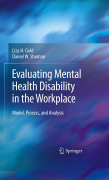
Evaluating mental health disability in the workplace: model, process, and analysis
Gold, L.H.
Shuman, D.W.
As many as one in four adults in the workforce will suffer from psychiatric illness in a given year. Such illness can have serious consequences – job loss,lawsuits, workplace violence – yet the effects of mental health issues on jobfunctioning are rarely covered in clinical training. In addition, clinicians are often asked to provide opinions on an employee’s fitness for work or an evaluation for disability benefits, only to find themselves embroiled in complexlegal and administrative conflicts. A unique collaboration between a renownedprofessor of clinical psychiatry and a noted legal expert, Evaluating Mental Health Disability in the Workplace approaches the topic from two distinct areas: the legal context and issues relevant to disability and disability-related evaluations, and the interplay of factors in the relationship between work andpsychiatric illness. Subject matter that is not often simultaneously reviewedor reviewed in-depth in terms of both psychiatric and legal context Reviews empirical data regarding the relationships between specific psychiatric disorders and associated functional impairments that may result in workplace disabilities INDICE: From the contents Taking the High Road: Ethics and Practice in Employment Evaluations. Employment Evaluations and the Law. Why We Work: Psychological Meaning and Effects. Psychiatric Disorders, Functional Impairment, and the Workplace. Psychiatric Disability: A Model for Assessment. Practice Guidelines for Mental Health Disability Evaluations in the Workplace. The Maze of Disability Benefit Programs: Social Security Disability, Workers’ Compensation, and Private Disability Insurance. Working with Disabilities: The Americans withDisabilities Act. Fitness-for-Duty Evaluations. Conclusion. Appendix I: The American Academy of Psychiatry and the Law: Ethics Guidelines for the Practice of Forensic Psychiatry, 2005. Appendix II: The American Psychology-Law Society, Committee on Ethical Guidelines of Division 41 of the American PsychologicalAssociation and the American Academy of Forensic Psychology: Specialty Guidelines for Forensic Psychologists, 1991.
- ISBN: 978-1-4419-0151-4
- Editorial: Springer
- Encuadernacion: Cartoné
- Páginas: 345
- Fecha Publicación: 01/07/2009
- Nº Volúmenes: 1
- Idioma: Inglés
